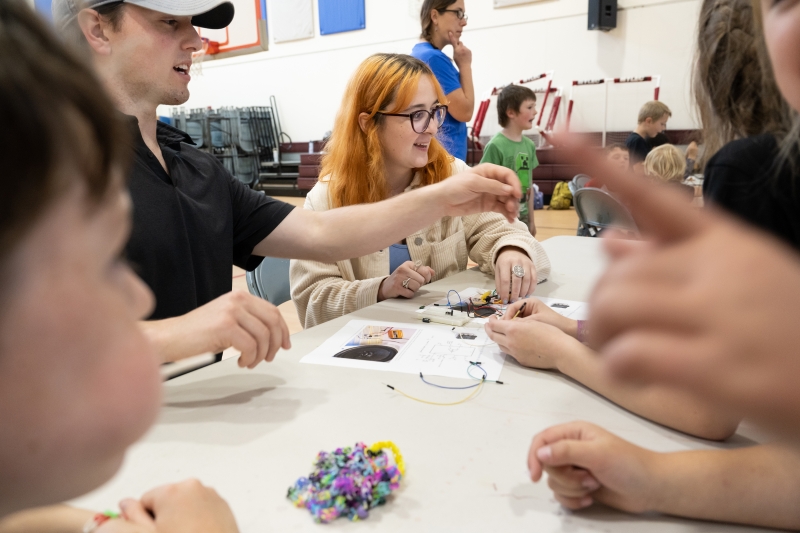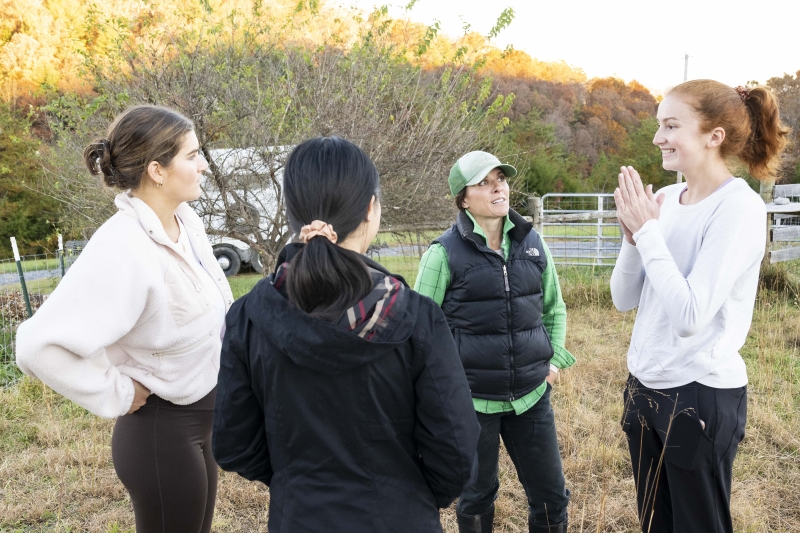Community-Based Learning’s Fall Term Collaborations Community-Based Learning’s collaborations this fall offered students an opportunity to deepen community connections.
“Community-based learning is a method and model that can help faculty revitalize courses and invent new ones to create new ways of engaging students and work with our vibrant local community.”
~Sascha Goluboff, director of community-based learning and professor of cultural anthropology
Washington and Lee’s Office of Community-Based Learning (CBL) explored opportunities for rethinking its curriculum during the COVID-19 pandemic, but in-person activities resumed this fall with regard to sending students into the Rockbridge County community to complete coursework, resulting in fresh collaboration between the campus and community.
Community-based learning is an educational approach that integrates learning and mentorship with community engagement. At W&L, the Office of Community-Based Learning supports, enhances and develops mutually beneficial collaborations with local and regional community partners that advance community interests, while supporting student learning through structured learning activities, critical reflection and credit-bearing coursework.
Jon Erickson’s Electrical Circuits course previously worked with the YMCA after school program in fall 2019, and students were eager to return to hands-on learning this Fall Term in partnership with the program’s Central Elementary School location. This year’s “Electric Mondays” project, in which W&L students teach local elementary school children about circuits in a series of labs, is a continuation of this program. Other YMCA collaborations have included Sarah Blythe’s biology course Food for Thought, which organized a YMCA after school nutritional program, and Brain Awareness Week, which will return this spring to the YMCA after school program and is organized in collaboration with the university’s Neuroscience Program. The Bonner and Shepherd Programs also consistently collaborate with the YMCA after school program in partnerships linked to academic credit.
“We love to have community partners come into our programs,” said Jordan Givens, childcare director for the Rockbridge YMCA. “The kids really enjoy meeting new folks and learning about topics they may not be able to in school or through our programming. The students get experience not only interacting with the kids but teaching the subject matter they have learned in their courses.”
Washington and Lee students had the opportunity to connect with alumni and a few furry friends this fall at Yonderyear Farm, a new local business recently added to the roster of community projects being tackled by Washington and Lee’s Student Consulting group (WLSC). WLSC is a student organization and a co-curricular program housed in the Williams School of Commerce, Economics, and Politics. Students meet on weekly basis with Lloyd Tanlu, associate professor of business administration, to develop professional skills and engage with guest speakers. Students also present and provide feedback on each of the individual projects. In addition, Tanlu’s business administration course on student consulting (BUS 197) is a designated CBL course, which provides undergraduate students the opportunity to approach projects with a community-development lens.
CBL courses conform to four broad categories and the CBL staff work with W&L faculty members and community partners to decide which model works best for them.
- Site-based activities place students at designated locations where they serve the mission of a community organization, while also applying and extending their knowledge and skills.
- Project-based activities require students, faculty and community partners to collaborate on a project with the purpose of addressing a defined goal.
- In classes focused on research, community partners collaborate with faculty to define the research question, design and implement the project, and shape the final deliverable product.
- Other CBL courses feature community partner seminars where students join faculty and learning partners from the wider community to read, discuss and learn together about a topic of broad social relevance. Such W&L courses have been taught at the Augusta Correctional Center near Craigsville, Virginia.
Looking ahead, Winter Term 2023 will offer a wide range of community-engaged opportunities to students. Following a few years of interruption due to the pandemic, the Volunteer Income Tax Assistance (VITA) program is reemerging. In this nationwide initiative of the Internal Review Service (IRS), accounting students will be able to offer free tax preparation services to underserved members of the wider Rockbridge area. Other projects will bring neuroscience students participating on an evidence-based art program to Kendal at Lexington, a local retirement community, to create art with individuals with dementia, and sociology students will be conducting a housing study with Bath County, Virginia, among other new course partnerships.
Sascha Goluboff, director of community-based learning and professor of cultural anthropology, is enthusiastic about opportunities to expand CBL curriculum into new disciplines and programming across the university, especially as the institution rethinks its general education requirements.
“Community-based learning is a method and model that can help faculty revitalize courses and invent new ones to create new ways of engaging students and work with our vibrant local community,” Goluboff said.
 CBL Class at Central Elementary School
CBL Class at Central Elementary School A student consulting group on a site visit to Yonderyear Farm
A student consulting group on a site visit to Yonderyear Farm
You must be logged in to post a comment.